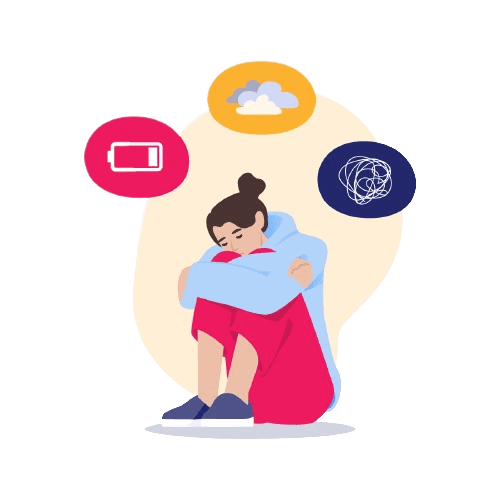Bipolar Disorder Assessment Test
3 Min Free Bipolar Disorder Assessment Test
What is Bipolar Disorder?
Bipolar disorder, formerly known as manic-depressive illness, is a mental health condition characterized by extreme shifts in mood, energy levels, and activity levels. It involves episodes of mania and depression, which are distinct periods of elevated and low mood, respectively. These episodes can range in intensity and duration.
There are several types of bipolar disorder, including bipolar I disorder, bipolar II disorder, cyclothymic disorder, and other specified and unspecified bipolar and related disorders. The primary distinguishing factor between bipolar I and II disorders is the severity of the manic episodes. In bipolar I disorder, individuals experience full-blown manic episodes, while bipolar II disorder involves hypomanic episodes (less severe than mania) and major depressive episodes.

Symptoms of Bipolar Disorder
The symptoms of depression can vary from person to person, but they often include:
- Manic mood
- Depressive mood
- Increased energy and activity
- Psychomotor Retardation
- Rapid speech
- Racing thoughts
- Impulsivity and risk-taking behavior
- Feelings of Guilt or Worthlessness
- Decreased need for sleep
- Psychomotor agitation or restlessness
- Suicidal thoughts
- Seasonal Patterns

Who Can Benefit From This Bipolar Disorder Assessment?
The bipolar disorder assessment can benefit individuals who suspect they may be experiencing symptoms of bipolar disorder or have concerns about their mood fluctuations. It can provide a preliminary evaluation of bipolar disorder-related experiences, helping individuals gain insight into their condition.
The assessment can be useful for those who experience significant mood swings, disruptions in daily functioning, impulsive behaviors, or a family history of bipolar disorder. However, it’s important to note that the assessment does not provide a formal diagnosis but can serve as a helpful screening tool. Seeking professional help from a mental health provider is advised for a comprehensive evaluation and appropriate treatment options.
Types of Bipolar Disorder Assessment
Mood Disorder Questionnaire (MDQ):
The MDQ is a self-report screening tool designed to assess symptoms of bipolar disorder. It consists of a series of questions that inquire about the presence and impact of mood episodes.
Bipolar Spectrum Diagnostic Scale (BSDS):
The BSDS is a self-report questionnaire that assesses the presence and severity of bipolar disorder symptoms. It evaluates a range of symptoms associated with both manic and depressive episodes.
Young Mania Rating Scale (YMRS):
The YMRS is a clinician-administered assessment tool that measures the severity of manic symptoms. It includes items related to mood, energy level, speech, thought content, and disruptive behavior.
Hamilton Depression Rating Scale (HAM-D):
The HAM-D is a clinician-administered assessment tool used to evaluate the severity of depressive symptoms. It covers various aspects of depression, such as mood, guilt, insomnia, and psychomotor symptoms
Structured Clinical Interview for DSM-5 (SCID-5):
The SCID-5 is a comprehensive clinical interview conducted by mental health professionals to diagnose various mental disorders, including bipolar disorder. It follows a structured format and assesses the presence of specific diagnostic criteria.
Clinical observation and history-taking:
Mental health professionals may also rely on clinical observation and detailed history-taking to assess bipolar disorder symptoms. They may inquire about the individual’s mood patterns, behavior, and family history, as well as conduct a thorough psychiatric evaluation.
Treating Bipolar Disorder
Treating bipolar disorder typically involves a combination of medication, psychotherapy, and lifestyle adjustments. Here are common treatment options:
- Medication: Mood stabilizers, such as lithium, are commonly prescribed to help stabilize mood and prevent episodes of mania or depression. Other medications, such as anticonvulsants and atypical antipsychotics, may also be used to manage symptoms. It is important to work closely with a psychiatrist to find the most effective medication and to monitor potential side effects.
- Psychotherapy: Psychotherapy, such as cognitive-behavioral therapy (CBT), can help individuals manage their symptoms and develop coping strategies. CBT focuses on identifying and challenging negative thought patterns and behaviors associated with bipolar disorder. Interpersonal and social rhythm therapy (IPSRT) may also be beneficial in helping individuals stabilize daily routines and manage relationship issues.
- Psychoeducation: Psychoeducation involves learning about bipolar disorder, its symptoms, triggers, and treatment options. It helps individuals and their families understand the condition, improve medication adherence, and recognize early warning signs of relapse.
- Lifestyle adjustments: Regular sleep patterns, stress reduction techniques, and maintaining a healthy lifestyle can help individuals manage bipolar symptoms. Avoiding substance abuse and incorporating a balanced diet, exercise, and self-care practices can also contribute to overall well-being.
- Support network: Building a strong support system is essential for individuals with bipolar disorder. This may involve participating in support groups, involving family and friends in the treatment process, and seeking assistance during challenging times.
- Personalized treatment plan: Bipolar disorder treatment should be tailored to the individual’s needs. Collaborating with a psychiatrist and therapist to develop a personalized treatment plan, including medication adjustments and therapy goals, is crucial.
Regular follow-ups with healthcare professionals are important to monitor treatment effectiveness, manage medication, and make necessary adjustments. It’s important for individuals with bipolar disorder to communicate openly with their healthcare team and seek support when needed. With proper treatment and self-care, individuals with bipolar disorder can effectively manage their symptoms and lead fulfilling lives.

